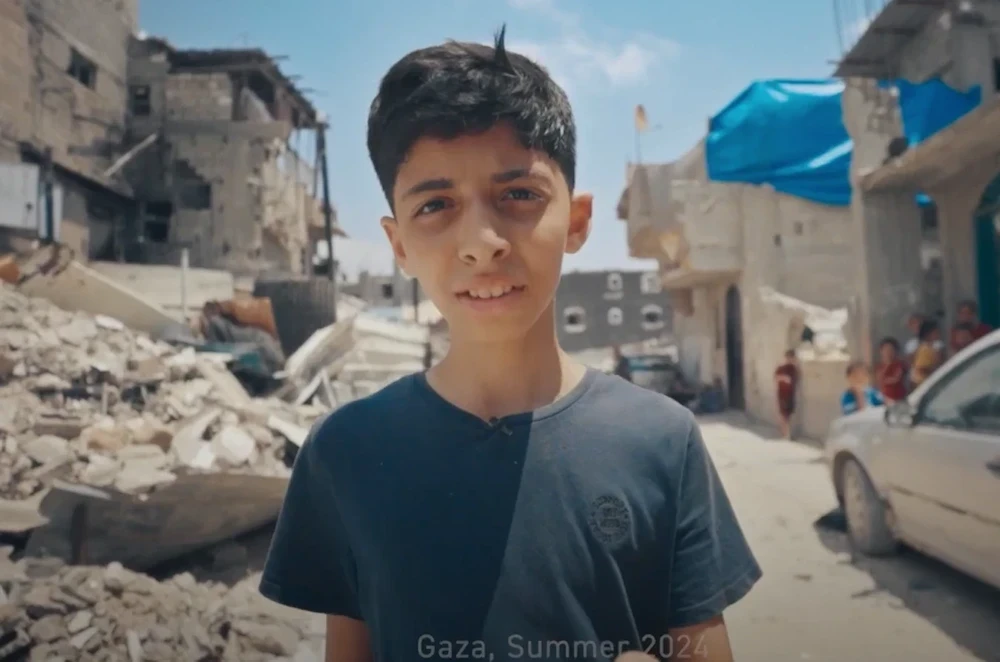Dimbleby slams RTS as ‘cowards’ for dropping Gaza journalists award
Jonathan Dimbleby accused the Royal Television Society of bowing to political pressure amid controversy over a BBC documentary.
-
 This screenshot from the trailer for 'Gaza: How To Survive A War Zone' shows Palestinian child Abdullah Al-Yazouri. (Youtube screenshot)
This screenshot from the trailer for 'Gaza: How To Survive A War Zone' shows Palestinian child Abdullah Al-Yazouri. (Youtube screenshot)
Jonathan Dimbleby has accused the Royal Television Society (RTS) of cowardice after it scrapped an award recognizing journalists in Gaza, citing concerns about intensifying controversy surrounding a BBC documentary on the Israeli war.
The historian and broadcaster, alongside 300 other TV and film professionals, signed a letter condemning the RTS' last-minute decision to drop the award at its recent ceremony.
The move followed backlash over "Gaza: How to Survive a Warzone," a BBC documentary pulled from streaming platforms in February because its 13-year-old narrator, Abdullah al-Yazouri, was the son of Hamas’ deputy minister of agriculture.
Dimbleby criticized the RTS’ rationale, telling The Times, “The decision is craven and the grounds on which it has been made – the fact that there is an issue around one BBC film – are specious and shallow. No journalist working in Gaza was involved in the making of that film.”
Emphasizing the importance of frontline reporting, he added, “We depend hugely on the reporting of those journalists who are in Gaza, who put their lives on the line every day, because no Western journalists can enter except on specially conducted trips. The RTS is rightly held in very high regard and that it should suddenly abdicate its role because it doesn’t want to muddy the water is cowardly and ill-judged.”
‘Fuel to the Fire’
In an email to the RTS jury chairs, first reported by Deadline, the society explained its decision, stating it did not want to “add fuel to the fire in this current environment.”
Adrian Wells, chairman of the RTS Television Journalism Awards, elaborated, “We had planned to award it to ‘Journalists in Gaza’ to recognise their enormous efforts over the last 18 months or so of extreme pressure and endeavour. However, this award, in the end, will not be given on Wednesday."
“Already this has become a political football and the RTS is keen not to add fuel to the fire in this current environment. It is a shame that this cannot proceed but rest assured there is a very strong showing and recognition of journalism from Gaza throughout the rest of the evening.”
An RTS spokesperson further defended the decision, stating, “Investigations have recently been launched into a number of news reports from Gaza and, as those reviews are ongoing, we didn’t feel it was appropriate to proceed with the award this year.”
Earlier this month, pro-Palestinian activists condemned the BBC for removing a documentary about "Israel’s" violent actions in the Gaza Strip from its streaming service, projecting the film onto the broadcaster's Scotland office.
Members of the Gaza Genocide Emergency Committee, carrying Palestinian flags, gathered outside the BBC Scotland headquarters in Glasgow, chanting slogans like “Boycott the BBC” and “Don’t pay the license fee.”
They condemned the BBC’s "shameful" decision to remove the documentary "Gaza: How To Survive a Warzone" from iPlayer and proceeded to project it back onto the corporation’s building in Glasgow.
Deeper insight
The film, produced by independent company Hoyo Films, was broadcast on BBC Two on February 16. However, it was taken down five days later following complaints from those advocating "Israel’s" genocide against Palestinians in Gaza.
Following the revelation that the film’s 13-year-old English-speaking narrator, Abdullah, was the son of Ayman al-Yazouri, a deputy minister for agriculture in Gaza, pro-"Israel" activists increased pressure on the BBC.
In contrast, hundreds of TV and film professionals, along with journalists, wrote an open letter to the BBC, condemning the broadcaster’s decision to remove the program as "politically motivated censorship." They also condemned the “racist assumptions and weaponization of identity” regarding the narrator’s background.
Meanwhile, the International Centre for Justice for Palestinians criticized the concerns raised about the documentary, urging the BBC to “stand firm against these attempts to prevent first-hand accounts of life in Gaza from reaching audiences.”
BBC succumbs to Israeli lobby
Late last month, the British government held an urgent meeting with the BBC regarding a documentary about children's lives in Gaza, which came under intense scrutiny, particularly from the Israeli lobby.
The BBC had long been accused of pro-Israeli bias, with even its internal employees and editors voicing their discontent with the broadcaster's editorial policy, particularly amid the war on Gaza.
In mid-February, BBC aired the documentary, but then withdrew it following pressure from the Israeli lobby.
The film came under intense scrutiny after it was revealed that one of its featured children, 13-year-old Abdullah Alyazouri, was the son of Dr. Ayman Alyazouri, a deputy minister in the Gaza government.
The BBC's decision to withdraw the documentary followed pressure from pro-"Israel" advocates, including the Israeli ambassador to the UK, as well as British officials such as Culture Secretary Lisa Nandy, who suggested that she would engage with the BBC over the matter.
While the BBC stated it was conducting “further due diligence” on the production, the decision sparked widespread debate about media impartiality and the portrayal of Palestinians in British media. The broadcaster noted that the film "features important stories" about the experiences of children in Gaza but would not be available on iPlayer while the review was ongoing.

 5 Min Read
5 Min Read








